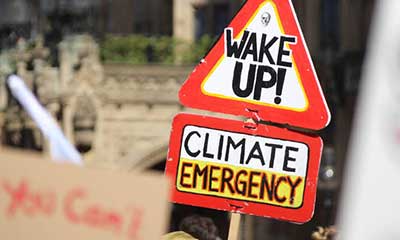Every country should declare a "Climate Emergency" : UN Chief
On the occasion of fifth anniversary of the Paris climate agreement , United Nations secretary-general Antonio Guterres called on every country to declare a "climate emergency in their countries until carbon neutrality is reached ". With the impacts of climate change increasingly stark since the Paris deal was struck - ranging from wildfires in Australia and California to collapsing ice sheets - popular pressure has grown on leaders to listen to warnings from scientists.
UN chief is now focusing on an effective implementation of provisions of Paris climate agreement. America's new administration has signnled that it will rejoin Paris agreement. China has also shown it's new commitment to adhere to the provisions of paris agreement. Likewise all countries will have to redefine their priorities to achieve paris accord's goals.
Climate change is real and human activities are the main cause. According to IPCC, The concentration of greenhouse gases in the earth’s atmosphere is directly linked to the average global temperature on Earth. IPCC says that the concentration has been rising steadily, and mean global temperatures along with it, since the time of the Industrial Revolution. The most abundant greenhouse gas, accounting for about two-thirds of greenhouse gases, carbon dioxide (CO2), is largely the product of burning fossil fuels.
What are the effects and impacts of climate change?
Impacts of a 1.1-degree increase are here today in the increased frequency and magnitude of extreme weather events from heatwaves, droughts, flooding, winter storms, hurricanes and wildfires. (IPCC)
The global average temperature in 2019 was 1.1 degrees Celsius above the pre-industrial period, according to WMO.
2019 concluded a decade of exceptional global heat, retreating ice and record sea levels driven by greenhouse gases produced by human activities. (WMO)
Average temperatures for the five-year (2015-2019) and ten-year (2010-2019) periods are the highest on record. (WMO)
2019 was the second hottest year on record. (WMO)
The total annual global greenhouse gas emissions reached its highest levels in 2018, with no sign of peaking. (EGR, 2019).
Based on today’s insufficient global commitments to reduce climate polluting emissions, emissions are on track to reach 56 Gt CO2e by 2030, over twice what they should be. (EGR, 2019)
What do we need to do to limit global warming and act on climate change?
To prevent warming beyond 1.5°C, we need to reduce emissions by 7.6% every year from this year to 2030. (EGR, 2019)
10 years ago, if countries had acted on this science, governments would have needed to reduce emissions by 3.3% each year. Every year we fail to act, the level of difficulty and cost to reduce emissions goes up. (EGR, 2019)
Nations agreed to a legally binding commitment in Paris to limit global temperature rise to no more than 2°C above pre-industrial levels but also offered national pledges to cut or curb their greenhouse gas emissions by 2030. This is known as the Paris Agreement. The initial pledges of 2015 are insufficient to meet the target, and governments are expected to review and increase these pledges as a key objective this year, 2020.
The updated Paris Agreement commitments will be reviewed at the climate change conference known as COP 26 in Glasgow, UK in November 2021. This conference will be the most important intergovernmental meeting on the climate crisis since the Paris agreement was passed in 2015.
The success or otherwise of this conference will have stark consequences for the world. If countries cannot agree on sufficient pledges, in another 5 years, the emissions reduction necessary will leap to a near-impossible 15.5% every year. The unlikelihood of achieving this far steeper rate of decarbonization means the world faces a global temperature increase that will rise above 1.5°C. Every fraction of additional warming above 1.5°C will bring worsening impacts, threatening lives, food sources, livelihoods and economies worldwide.
Countries are not on track to fulfil the promises they have made. Increased commitments can take many forms but overall they must serve to shift countries and economies onto a path of decarbonization, setting targets for net zero carbon, and timelines of how to reach that target, most typically through a rapid acceleration of energy sourced from renewables and rapid deceleration of fossil fuel dependency.







